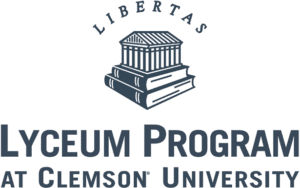The pilot class of the Lyceum Scholars Program came to Clemson University in 2013 with high expectations and it’s safe to say they met those expectations, and then some.

The first four students in the Clemson Institute for the Study of Capitalism’s (CISC) Lyceum Scholars Program all graduated in May as members of the Calhoun Honors College and plan to take their academic pursuits to higher levels.
“We couldn’t be more proud of this first class of Lyceum Scholars,” said Eric Allison, associate director of academic programs for the Institute. “Our pilot graduating class succeeded at every level in this innovative, one-of-a-kind program.”
CISC’s Lyceum Scholars Program was created with the goal of bringing the traditional liberal arts education to a modern university setting. Today, the program boasts 20 Lyceum Scholars, with 10 more set to enter Clemson this fall.

The 2017 graduates from the Lyceum Scholars Program’s pilot class include:
Fred Hannah, Columbia, South Carolina – Attending the University of South Carolina Law School, studying constitutional law.
Henry Thompson, Seneca, South Carolina – Pursuing a Ph.D. in economics at George Mason University.
William Turton, LaGrange, Georgia – Pursuing a master’s degree in politics at Hillsdale College’s Graduate School of Statesmanship.
Haley Walker, Severna Park, Maryland – Teaching English in China for a year before attending law school.
Turton, who is interning this summer at the Heritage Foundation, a public policy think tank in Washington, D.C., said he benefited from the Lyceum Scholars Program on many levels.
“First, it provided me with a strong foundation in political thought, which is invaluable to anyone starting out in the political arena. In applying to graduate schools and internships, my involvement showed an intellectual commitment that set me apart from other applicants,” he said.
“And on a practical level, the Lyceum Program sharpened my ability to write in a clear and concise manner, which is important when trying to convey complex ideas in the field of public policy.”
Thompson said the Lyceum experience exceeded his expectations and was instrumental in shaping his character, career interests, and the way in which he views the world.
“It taught me the importance of being a virtuous person and to question the true purpose of government, according to its founders,” he said. “Most importantly, it taught me to ask ‘why’ questions, rather than the ‘how’ questions, which so many individuals are concerned with today.”
Students accepted into CISC’s Lyceum Scholars Program receive a $10,000 scholarship over four years. During that time, they study the moral foundations of capitalism in the only university-based program of its kind in the U.S.
“This group of students excelled in the intellectual community created by the Lyceum program,” added Allison. “Beyond their academic achievements, these young citizens built lifelong intellectual friendships that will endure in whatever career course they pursue.”
About the Clemson Institute for the Study of Capitalism
CISC is America’s first and only university-based teaching and research center dedicated to exploring the moral, political and economic foundations of capitalism. Founded in 2005, the Institute is educating a new generation of students about the moral requirements of a free society.
Get in touch and we will connect you with the author or another expert.
Or email us at news@clemson.edu

